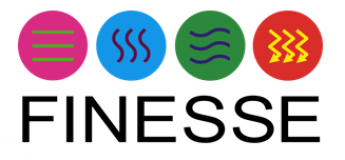The FINESSE consortium has created a unique and exhaustive European training programme to provide not only academic training at the highest level, but also substantial field experience in private companies and training in transferable skills, etc. to kick-start the future career of the 15 fellows, destined to bring a meaningful contribution to the field of distributed optical fibre sensing both in European academy and in industry.
Individual research-related training:
The 15 ESR fellows will be trained at their host institution under academic supervision to gain experience in research methodologies, experimental set up, data collection methods, etc. that will be used to properly conduct their research programme. This also includes training in complementary skills: scientific presentation, ethics of research, protecting and exploiting research, documenting research, managing a research project, information sources, technical writing, laboratory record keeping, etc. Students recruited by industrial partners will benefit from graduate programs through their affiliated university.
Besides research training by the ESRs’ local supervisors, our training network relies strongly on secondments. The ESRs will spend at least 25% of their research training programme outside their host institution as secondments in partner institutions,where they will benefit from on-job industrial experience and field validation during industrial secondment(s) and acquire competences in transferable skills.
Training by common education :
5 Training Events (TE), in the form of PhD schools which all ESR fellows will have to attend, , will be organised during FINESSE. These TEs will cover not only all the important topics involved in distributed fibre sensing but also transverse activities related to transferable skills (how to collaborate in large projects, entrepreneurship in photonics, management of intellectual property, communication strategies, etc.). In addition, 2 conferences and annual research workshops and meetings will be organised to foster collaboration and to consolidate the networking, to brainstorm about difficult problems and to investigate together new topics and developments.
Training through Personal Career Development Plan
Depending on the established research programme, each ESR fellow will need specific theoretical and technical complementary trainings to meet the research objectives. The academic host or industrial partner recruiting the ERS will, in consultation with the fellow, devise a tailor-made programme within the first few months after hiring the ESR that will be independently conducted by the host institution.These courses include:
- Use of specific software (COMSOL, LabView, etc.), doctoral courses at the host institution, or on the use of technical equipment.
- Complementary skills training such as project management courses, language courses, entrepreneurship courses.
